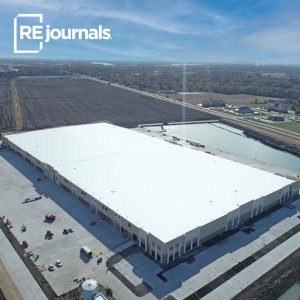Contegra’s Gowin: “I miss the people, but we are getting by”
 May 7, 2020 | The COVID-19 pandemic has changed the way commercial real estate professionals work. Eric Gowin, founder and managing member of Contegra Construction Co. is no different.
May 7, 2020 | The COVID-19 pandemic has changed the way commercial real estate professionals work. Eric Gowin, founder and managing member of Contegra Construction Co. is no different.
Contegra, which serves the St. Louis region from its offices in St. Charles, Missouri, and Edwardsville, Illinois, is still active, taking on projects throughout the region. The construction company, for instance, has been busy with such major projects as NorthPoint Development’s 544,000-square-foot Gateway TradePort in Pontoon Beach, Illinois, and TriStar Properties’ 594,000-square-foot bulk storage warehouse at Gateway Commerce Center in Edwardsville, Illinois.
But there’s no denying that the pandemic has forced Gowin and his company to adapt.
Gowin recently spoke to Midwest Real Estate News about how the coronavirus has changed his company and the commercial real estate industry. He also shared his thoughts on what the pandemic will mean to the industrial sector and what life might look like in CRE after shelter-in-place orders expire.
Here is some of what Gowin had to say.
This pandemic has changed work life for so many of us. How are things different for you and Contegra?
Eric Gowin: I’d say that about 90 percent of our office staff is at home and working remotely. We do have a number of key employees who still come to the office every day. In the field, we still have projects going forward, so those employees on the job sites are still working.
We had one project shut down in Pennsylvania because of COVID-19. It has since reopened. The tenant filed an appeal and got the job reopened. Another project in Texas has been shut down because there was a positive test for COVID-19 by an electrician. Those are the kind of issues we are facing. That project in Texas, though, has since reopened after a thorough cleaning.
Has it been a difficult adjustment?
Gowin: The hardest part is that we can’t have those physical meetings with developers and end users when everyone is working from home. We are doing Microsoft Teams and Zoom meetings to keep the ball rolling on projects in the pipeline. But it’s not quite the same as doing the in-person meetings. I do miss those.
I used to be able to just go down the hall to the accounting department and ask a question. I used to be able to call a quick meeting with people. Now it is all these nonstop Microsoft Teams meetings. We have adjusted well, though. People have been productive from home. In this industry, you can do anything as long as you have a laptop connected to the Internet.
I do feel bad for the people in the field. They are out there in all of this. That’s part of the reason why I go into the office. I feel like I owe it to those people on the job site to be in the office and working here, too. When this first started, the office was completely empty except for me. But now we have seen some people trickle in who say they can’t work from home any longer. They have to work in the office to get things done. They need to shut a door and have their virtual meetings.
It’s been OK. It is strange to see the office mostly empty. I miss the people, but we are getting by.
The industrial market in St. Louis, and across the country, had been so strong before this pandemic hit. Do you think this sector is resilient enough to survive the country’s shutdown?
Gowin: I do. During the past seven-plus years, there has been a massive shift to e-commerce. A lot of our end users and third-party logistics firms are dealing in the e-commerce world. What we have seen since this started is that the e-commerce orders have ramped up even more. The people we know in the logistics world are running wide open right now.
I do hope that the pandemic will mean that there will be more production here locally and nationally. I hope that we see products warehoused here and not brought over in a container from China and other countries. That would be a positive for the industrial sector and the country.
Has this pandemic highlighted some shortfalls in the country’s supply chain?
Gowin: We have been focusing for a long time on last-mile logistics here in St. Louis and in other parts of the country. I think it is important for us to shorten even more our logistics supply lines or to increase our delivery efficiencies.
We have seen that it is taking longer to get something that is considered non-essential delivered. The priorities, rightly so right now, are for PPE and other essential items. That might be surprising some people.
But even before the pandemic, there had been some challenges for companies related to the supply chain. There has long been a shortage of labor to man the warehouse areas. Those entry-level positions have been harder to find. Companies are fighting amongst each other to draw that talent. It is getting harder and harder to man the warehouses.
How strong had the industrial sector been before the shelter-in-place orders went out?
Gowin: Before the pandemic, this sector had been robust. In the St. Louis market, the absorption was about 1 million square feet a year. The last few years, there were some big deals in the market. The industrial market was definitely ticking upward. This sector has always been strong here. You don’t see the big peaks and valleys you see in some other markets. It kind of cruises along.
What do you think will happen with the industrial sector now?
Gowin: I think that you will see the office and hospitality projects hit pause for a while. But for warehouse and industrial, for infrastructure projects? We have not seen an indication that it is going to slow down.
Article courtesy of REJournals




